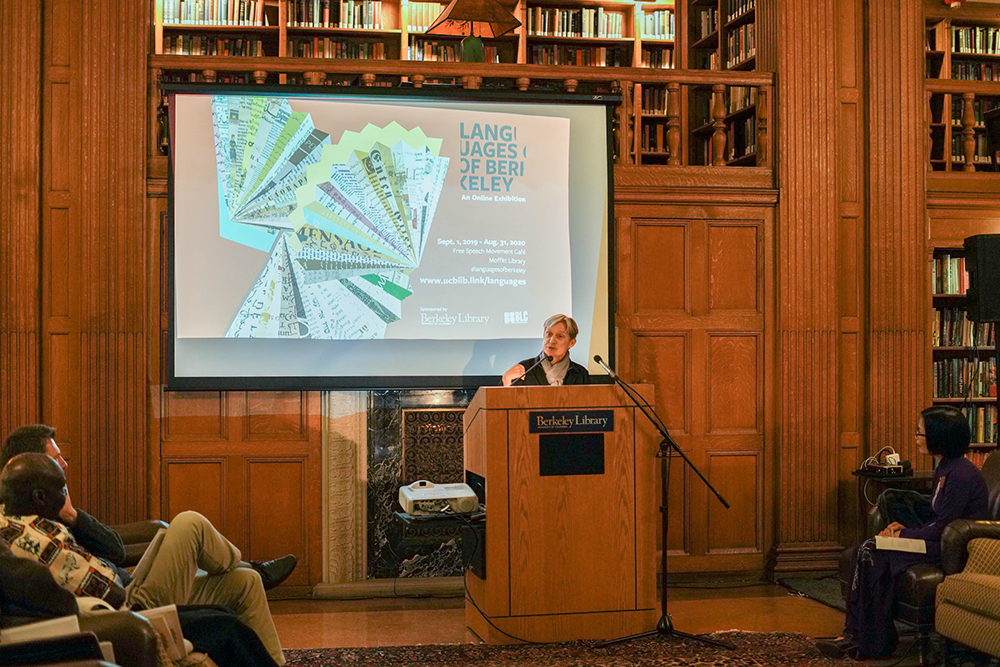
“If we were only to work in English, we would misunderstand our world.
Monolingualism keeps us parochial even if the language we speak
has achieved global dominance.”
In her keynote lecture on Feb. 5 for the exhibit reception for The Languages of Berkeley, Judith Butler said that “At UC Berkeley and in this Library in particular, in language courses and in literature and history courses, students and faculty alike understand themselves to be part of an ongoing multilingual experiment—one that brings with it different histories and cultures, different ways of understanding the social world.” A world-renowned philosopher, gender theorist, and political activist, Butler is best known for her book Gender Trouble: Feminism and the Subversion of Identity (1990), and its sequel, Bodies That Matter: On the Discursive Limits of ‘Sex’ (1993), which have both been translated into more than twenty languages. Her most recent book is The Force on Nonviolence: An Ethico-Political Bind (2020). She has taught at Cal for 27 years in the Department of Comparative Literature and in the Program of Critical Theory, where she is Maxine Elliot Professor. Among her achievements, she is currently the 2020 president of the Modern Language Association, in which she is, in the words of Professor Rick Kern, “the lead advocate for languages in the United States.”
Butler’s lecture, “The Promise of Multilingualism,” eloquently put into words the inspiration for the exhibition itself. “In learning another language, we practice humility in an effort to gain knowledge and to live in a broader world—one that exceeds the national boundaries that too often divide us,” she said. “The passage through humility gives us greater capacity to live and think in a multilingual world, to shift from one way of knowing to another.” Her entrancing talk that winter evening in the iconic Morrison Library—which followed nine short readings by faculty, students, and librarians in different languages—echoed and expanded on some of the ideas in Who Sings the Nation-State?: Language, Politics, Belonging which she co-wrote with Gayatri Spivak in 2007.
At Berkeley, and in literature, history, and philosophy departments especially, “multilingualism is our location and it means that we never assume one language holds the truth over any other,” she said. By learning and working in other languages, she posited, we experience both dislocation and an enriching humility finding ourselves less capable in another language than the primary one that we speak. For some of us, for whom English is a first language, we have a promising experience that productively challenges the notion that English is at the center of the world. “Each and everyone of us speaks a language that is foreign to someone else,” she affirmed. “At least here, at least potentially what we call ‘the foreign’ is actually the medium in which we live together, the enigmatic basis of our worldly connection with one another.”
The Arts & Humanities Division of the UC Berkeley Library and the Berkeley Language Center (BLC) hosted the reception for the online exhibition. University Librarian Jeff MacKie-Mason gave introductory remarks, and Rick Kern, director of the BLC and professor in the Department of French, introduced the keynote speaker. Romance Languages Librarian Claude Potts, who is the lead curator for the exhibition, involving more than 40 contributors, moderated the event. Four of those who read short texts in their original languages also contributed to the online sequential exhibit, which launched in February 2019 and will reach completion this summer, with approximately 70 entries representing most of the languages that are currently taught and used in research at Berkeley.
Virginia Shih for Vietnamese (South/Southeast Asia Library) – 13:40
Curator for the Southeast Asia Collection
Ahmad Diab for Arabic (Department of Near Eastern Studies) – 17:08
Assistant Professor
Yael Chaver for Yiddish (Department of German) – 23:50
Lecturer in Yiddish
Jeroen Dewulf for Dutch (Department of German and Dutch Studies Program) – 31:30
Director, Institute of European Studies
Interim Director, Institute of International Studies
Queen Beatrix Professor
Sam Mchombo for Chichewa (African American Studies) – 38:58
Associate Professor
Deborah Rudolph for Chinese (C.V. Starr East Asian Library) – 48:31
Curator
Marinor Balouzian and Natalie Simonian for Armenian (Armenian Studies Program) – 53:21
Undergraduate Students
Emilie Bergmann for Spanish (Department of Spanish & Portuguese) – 58:19
Professor
Robert Goldman for Sanskrit (Department of South and Southeast Asian Studies) – 1:07:05
Catherine and William L. Magistretti Distinguished Professor
See also the Library News story “Want to explore a language? At Berkeley, the possibilities are (nearly) limitless.”
Or the blog post “We All Speak a Foreign Language to Someone” by Caitlyn Jordan for the Townsend Center for the Humanities.
The Languages of Berkeley is a dynamic online sequential exhibition celebrating the diversity of languages that have advanced research, teaching and learning at the University of California, Berkeley. It is made possible with support from the UC Berkeley Library and is co-sponsored by the Berkeley Language Center (BLC).
Follow The Languages of Berkeley!
Subscribe by email
Contact/Feedback
www.ucblib.link/languages
![The Languages of Berkeley [fan]](https://update.lib.berkeley.edu/wp-content/uploads/2019/02/fan_languages-450px.jpg)